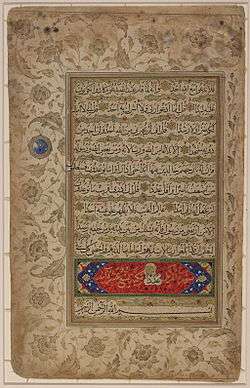Exorcism in Islam

Exorcism in Islam is called ruqya, and is thought to repair damage believed caused by sihr or witchcraft. Exorcisms today are part of a wider body of contemporary Islamic alternative medicine called al-Tibb al-Nabawi (Medicine of the Prophet).[1] Some people identifying as Muslim consider the practice to be "black magic" and contrary to Islam, in extreme cases advocating and executing severe punishment, even death.[2]
Islamic religious context
Islam has the concept of a malevolent Devil. Belief in Jinns, or supernatural beings, is also widespread in the Islamic world.[3][4]:68[5]:193:341
A related belief is that every person is assigned their own special jinnī, also called a qarīn (also called a hamzaad in Iran, India & Pakistan), of the jinn that whisper to people's souls and tell them to submit to evil desires.[6][7][8] The notion of a qarīn is not accepted by all Muslims. Some believe that Šayṭān whispers in human minds, and he is assigned to each human being.[9]
Procedure
In a typical Islamic exorcism the treated person lies down while a white-gloved therapist places a hand on their head while chanting verses from the Quran.[1] In one case a woman was made to drink large amounts of "holy" water, made to vomit, beaten, and made to bathe in hot water.[10]
Specific verses from the Quran are recited, which glorify God (e.g. The Throne Verse (Arabic: آية الكرسي Ayatul Kursi) and invoke his help. In some cases the adhan/"ah-zan" (the call for daily prayers) is also read, believed to have the effect of repelling non-angelic unseen beings or the jinn.
The Islamic prophet Muhammad taught his followers to read the last three suras from the Quran, Surat al-Ikhlas (The Fidelity), Surat al-Falaq (The Dawn) and Surat an-Nas (Mankind).
(e.g. The Throne Verse (Arabic: آية الكرسي Ayatul Kursi) :-
| Arabic | Translation |
|---|---|
|
اللّهُ لاَ إِلَـهَ إِلاَّ هُوَ الْحَيُّ الْقَيُّومُ لاَ تَأْخُذُهُ سِنَةٌ وَلاَ نَوْمٌ لَّهُ مَا فِي السَّمَاوَاتِ وَمَا فِي الأَرْضِ مَن ذَا الَّذِي يَشْفَعُ عِنْدَهُ إِلاَّ بِإِذْنِهِ يَعْلَمُ مَا بَيْنَ أَيْدِيهِمْ وَمَا خَلْفَهُمْ وَلاَ يُحِيطُونَ بِشَيْءٍ مِّنْ عِلْمِهِ إِلاَّ بِمَا شَاء وَسِعَ كُرْسِيُّهُ السَّمَاوَاتِ وَالأَرْضَ وَلاَ يَؤُودُهُ حِفْظُهُمَا وَهُوَ الْعَلِيُّ الْعَظِيمُ |
Allah - there is no deity except Him, the Ever-Living, the Sustainer of [all] existence. Neither drowsiness overtakes Him nor sleep. To Him belongs whatever is in the heavens and whatever is on the earth. Who is it that can intercede with Him except by His permission? He knows what is [presently] before them and what will be after them, and they encompass not a thing of His knowledge except for what He wills. His Kursi extends over the heavens and the earth, and their preservation tires Him not. And He is the Most High, the Most Great. |
This is not the only "Procedure"; there are many used in Muslim communities around the world. Examples are beating the afflicted, rolling in carpets and exposure to red pepper smoke. Most of them are absorbed from local pagan rituals, and they are not derived from Islamic teaching.[11]
Popularity of Islamic alternative medicine

The trend in al-Tibb al-Nabawi treatments, cosmetics and toiletries is often associated with fundamentalists who charge that Western, chemically laced prescriptions aim to poison Muslims or defile them with insulin and other medicines made from pigs.[1] Members of terrorist groups have been involved in Islamic remedies as healers and sellers, while some clinics are used as recruiting grounds for Islamist causes.[1]
“Islamic medicine carries a cachet that, by taking it, you are reinforcing your faith – and the profits go to Muslims,” says Sidney Jones, an expert on Islam in Southeast Asia with the International Crisis Group.[1]
See also
References
- 1 2 3 4 5 Hallowell, Billy (26 September 2011). "Some Asian Muslims Giving Up Western Meds for Islamic Exorcisms & Treatments". TheBlaze.
- ↑ "Jalal Uddin: Imam 'murdered by IS supporters' over 'black magic' healing". BBC News. 23 August 2016. Retrieved 23 August 2016.
- ↑ Quran 51:56–56
- ↑ al-Ṭabarī, Muḥammad ibn Ayyūb. Tuḥfat al-gharā’ib. I.
- ↑ Rāzī, =Abū al-Futūḥ. Tafsīr-e rawḥ al-jenān va rūḥ al-janān.
- ↑ Quran 72:1–2
- ↑ Quran 15:18–18
- ↑ Sahih Muslim, No. 2714
- ↑ Is it permissible to pray that my qareen becomes Muslim
- ↑ Staff (14 May 2012). "Belgium court charges six people in deadly exorcism of Muslim woman". Al Arabiya.
- ↑ sorry forgot to put Citation or Source. for the section of "just to note", I have over eight year of education in Islamic Teachings with none of my teachers ever describing any physical procedures. "Note for whoever is going to delete this section saying - not properly referenced - take my edit to any real Muslim cleric and he will testify, I do not have any blog or third rated book to support my edit. " my citation is the quran.
External links
Ruqyah treatment www.ruqyahonline.info